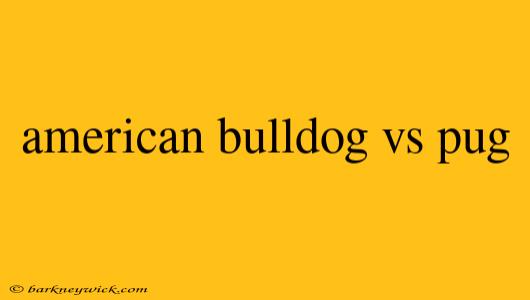American Bulldog vs. Pug: A Tale of Two Tails
I'll never forget the time I was walking my American Bulldog, Brutus, in the park. He's a gentle giant, but his size and imposing appearance often made other dog owners nervous. One day, a little Pug named Penny waddled up to Brutus, tail wagging furiously. Brutus, bless his heart, just gave her a sniff and went back to napping in the sun. That's the thing about Bulldogs: they're often misunderstood. They have a reputation for being aggressive, but in reality, they're just big softies.
Now, when it comes to choosing a dog, the American Bulldog and the Pug are two very different breeds. Both are loyal and loving companions, but they have vastly different temperaments, needs, and personalities. So, which breed is right for you? Let's dive into a comparison to help you decide.
American Bulldog: The Gentle Giant
The American Bulldog is a large, muscular breed with a powerful physique. They were originally bred for working purposes, like herding cattle and guarding property. However, today, they are primarily companion animals, known for their loyalty, intelligence, and affectionate nature.
Here are some key facts about the American Bulldog:
- Size: Males can weigh up to 120 pounds, while females can reach 80 pounds.
- Temperament: While they can be intimidating, they are typically friendly and playful with their families. However, they require strong leadership and consistent training to prevent potential aggression towards other dogs.
- Grooming: Their short coat is easy to maintain, requiring only occasional brushing.
- Health: They are prone to certain health issues like hip dysplasia and allergies.
- Exercise: They need a lot of exercise, including daily walks and playtime.
In my opinion, the American Bulldog is a great choice for active families who can provide consistent training and plenty of space for them to run and play. They need a lot of attention and socialization from a young age to ensure they grow up to be well-adjusted dogs.
Pug: The Clown of the Dog World
The Pug is a small, compact breed with a distinctive wrinkled face and a curly tail. They're known for their playful, goofy personalities and love of companionship. Pugs were originally bred as companion dogs for royalty in ancient China, and they still hold onto that regal attitude today.
Key Facts about the Pug:
- Size: They typically weigh between 14-18 pounds.
- Temperament: Pugs are known for their happy, playful personalities. They love to be around people and often have a comical, clown-like demeanor. They are also incredibly adaptable and can thrive in apartments as long as they get enough exercise.
- Grooming: Their short coat requires minimal grooming, but their wrinkles need regular cleaning to prevent skin infections.
- Health: Pugs are prone to certain health problems like brachycephalic syndrome (breathing difficulties), eye problems, and joint issues.
- Exercise: While they're energetic, their short legs and flat faces mean they don't need a ton of exercise. A daily walk and playtime are enough to keep them happy and healthy.
For me, Pugs are the epitome of a low-maintenance, high-reward companion dog. They're great for people who live in apartments or have a less active lifestyle. Their playful and affectionate nature makes them perfect for families with children, but it's important to supervise interactions to ensure the kids understand how to handle their small size.
Choosing the Right Breed for You
Ultimately, the best breed for you depends on your lifestyle and individual preferences.
Here's a quick rundown:
American Bulldog:
- Pros: Loyal, intelligent, athletic, affectionate.
- Cons: High energy, require consistent training, prone to certain health problems.
Pug:
- Pros: Playful, affectionate, adaptable, low-maintenance grooming.
- Cons: Prone to health issues, can be stubborn, require regular wrinkle care.
Think about these questions before making your decision:
- How much time and energy can you dedicate to training and exercise?
- What's your living situation? Do you have a yard or live in an apartment?
- How much time can you devote to grooming and potential health issues?
- What's your personality and lifestyle like? Do you prefer a calm companion or an active playmate?
Remember: It's always important to adopt from a reputable breeder or shelter to ensure you are getting a healthy and well-socialized dog.
And, just like the day Brutus and Penny met, remember that even the most different breeds can find common ground through their love for belly rubs and playtime.
